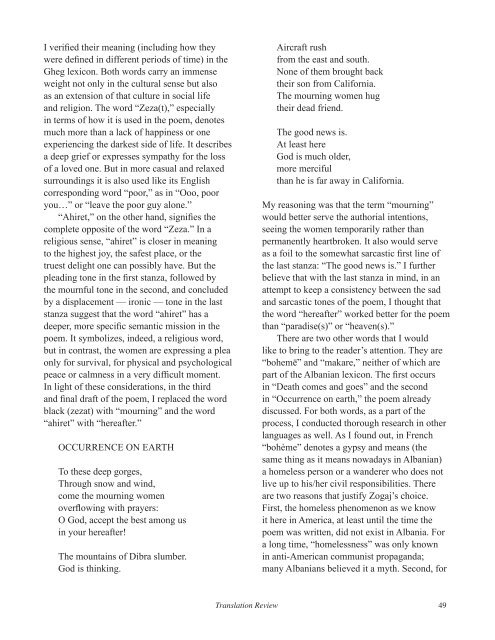Table of contents - The University of Texas at Dallas
Table of contents - The University of Texas at Dallas
Table of contents - The University of Texas at Dallas
You also want an ePaper? Increase the reach of your titles
YUMPU automatically turns print PDFs into web optimized ePapers that Google loves.
I verified their meaning (including how they<br />
were defined in different periods <strong>of</strong> time) in the<br />
Gheg lexicon. Both words carry an immense<br />
weight not only in the cultural sense but also<br />
as an extension <strong>of</strong> th<strong>at</strong> culture in social life<br />
and religion. <strong>The</strong> word “Zeza(t),” especially<br />
in terms <strong>of</strong> how it is used in the poem, denotes<br />
much more than a lack <strong>of</strong> happiness or one<br />
experiencing the darkest side <strong>of</strong> life. It describes<br />
a deep grief or expresses symp<strong>at</strong>hy for the loss<br />
<strong>of</strong> a loved one. But in more casual and relaxed<br />
surroundings it is also used like its English<br />
corresponding word “poor,” as in “Ooo, poor<br />
you…” or “leave the poor guy alone.”<br />
“Ahiret,” on the other hand, signifies the<br />
complete opposite <strong>of</strong> the word “Zeza.” In a<br />
religious sense, “ahiret” is closer in meaning<br />
to the highest joy, the safest place, or the<br />
truest delight one can possibly have. But the<br />
pleading tone in the first stanza, followed by<br />
the mournful tone in the second, and concluded<br />
by a displacement — ironic — tone in the last<br />
stanza suggest th<strong>at</strong> the word “ahiret” has a<br />
deeper, more specific semantic mission in the<br />
poem. It symbolizes, indeed, a religious word,<br />
but in contrast, the women are expressing a plea<br />
only for survival, for physical and psychological<br />
peace or calmness in a very difficult moment.<br />
In light <strong>of</strong> these consider<strong>at</strong>ions, in the third<br />
and final draft <strong>of</strong> the poem, I replaced the word<br />
black (zez<strong>at</strong>) with “mourning” and the word<br />
“ahiret” with “hereafter.”<br />
OCCURRENCE ON EARTH<br />
To these deep gorges,<br />
Through snow and wind,<br />
come the mourning women<br />
overflowing with prayers:<br />
O God, accept the best among us<br />
in your hereafter!<br />
<strong>The</strong> mountains <strong>of</strong> Dibra slumber.<br />
God is thinking.<br />
Aircraft rush<br />
from the east and south.<br />
None <strong>of</strong> them brought back<br />
their son from California.<br />
<strong>The</strong> mourning women hug<br />
their dead friend.<br />
<strong>The</strong> good news is.<br />
At least here<br />
God is much older,<br />
more merciful<br />
than he is far away in California.<br />
My reasoning was th<strong>at</strong> the term “mourning”<br />
would better serve the authorial intentions,<br />
seeing the women temporarily r<strong>at</strong>her than<br />
permanently heartbroken. It also would serve<br />
as a foil to the somewh<strong>at</strong> sarcastic first line <strong>of</strong><br />
the last stanza: “<strong>The</strong> good news is.” I further<br />
believe th<strong>at</strong> with the last stanza in mind, in an<br />
<strong>at</strong>tempt to keep a consistency between the sad<br />
and sarcastic tones <strong>of</strong> the poem, I thought th<strong>at</strong><br />
the word “hereafter” worked better for the poem<br />
than “paradise(s)” or “heaven(s).”<br />
<strong>The</strong>re are two other words th<strong>at</strong> I would<br />
like to bring to the reader’s <strong>at</strong>tention. <strong>The</strong>y are<br />
“bohemë” and “makare,” neither <strong>of</strong> which are<br />
part <strong>of</strong> the Albanian lexicon. <strong>The</strong> first occurs<br />
in “De<strong>at</strong>h comes and goes” and the second<br />
in “Occurrence on earth,” the poem already<br />
discussed. For both words, as a part <strong>of</strong> the<br />
process, I conducted thorough research in other<br />
languages as well. As I found out, in French<br />
“bohème” denotes a gypsy and means (the<br />
same thing as it means nowadays in Albanian)<br />
a homeless person or a wanderer who does not<br />
live up to his/her civil responsibilities. <strong>The</strong>re<br />
are two reasons th<strong>at</strong> justify Zogaj’s choice.<br />
First, the homeless phenomenon as we know<br />
it here in America, <strong>at</strong> least until the time the<br />
poem was written, did not exist in Albania. For<br />
a long time, “homelessness” was only known<br />
in anti-American communist propaganda;<br />
many Albanians believed it a myth. Second, for<br />
Transl<strong>at</strong>ion Review 49

















